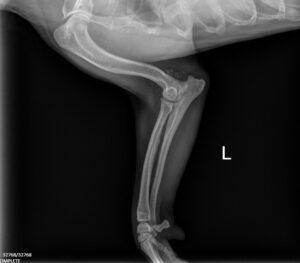
Mount Carmel Animal Hospital informs its readers about Arthritis Awareness Month and pet arthritis.
Canines and felines can be excellent at hiding their pain since they cannot verbally tell us what’s wrong. The month of May is devoted to spreading awareness about pet arthritis, prevention, and treatment. Mount Carmel Animal Hospital informs its readers about Arthritis Awareness Month and pet arthritis.
What’s Arthritis in Pets?
Arthritis, or osteoarthritis (OA), is a long-lasting joint disease that prevalently affects dogs and cats. This degenerative health condition makes dogs or cats lose their joint cartilage, leading to bone changes and causing inflammation, pain, and difficulty using the affected limb. Arthritis doesn’t just affect senior animals, it can develop at any age, especially if your pet is obese or has orthopedic conditions. While OA has no cure, there are several ways for slowing its progression, managing mobility to reducing pain.
Causes
Joints typically contain both fluid and cartilage, allowing smooth, flexible motion without rubbing the bone. With OA, joint fluid decreases, thinning the cartilage. This reduces the joints’ shock-absorbing capability. As the cartilage progressively deteriorates, bony changes surrounding the joint develop, causing more pain, inflammation, stiffness, and difficulty using the joint.
Many factors contribute to pet arthritis. Multiple orthopedic diseases might lead to OA development by causing repetitive injury to the joint cartilage – including elbow dysplasia, cranial cruciate ligament damage, hip dysplasia, previous fractures, repetitive high-impact activities and more.
Signs of Arthritis in Dogs
The clinical signs of pet arthritis might differ from mild to severe and be based on the chronicity and number of joints involved.
- Stiffness
- Pain
- Decrease in activity or reluctance to move
- Lameness or a change in gait
- Difficulty getting up from lying down or jumping on couches
- Muscle wasting
- Sudden behavioral changes, such as aggression
Diagnosis
Pet arthritis is diagnosed after a physical examination, where your vet will observe your dog’s gait and posture, and also feel for any abnormal changes to signs of pain. The vet will examine each joint, flexing and extending gently to feel for any signs of arthritis such as pain or crepitus. Your vet may also perform x-rays to further examine the joint or bony changes, to help diagnose any underlying orthopedic conditions.
Treatment
The treatment goal is to reduce pain, slow the progression of damage, and maintain or create muscle mass. Treatment of pet arthritis is accomplished with a mix of therapies, which might include any of the following:
Dogs
Treatment for dogs may include weight control, using the underwater treadmill, cold laser, and physical therapy. NSAIDs are prevalently prescribed medications to manage OA pain and inflammation. Your pet will require routine monitoring with blood work if they require long-term NSAIDs. Librela is a type of injectable medication that may be given once monthly to manage OA pain. Dogs with arthritis also benefit from joint supplementation. Dogs with disease progression can also be helped with added pain medication such as gabapentin.
Cats
Arthritis treatment for cats may include:
- Solensia is a monthly injectable treatment for cats that helps control pain from osteoarthritis.
- Cold laser therapy targets your pet’s damaged cells and helps them regenerate faster.
- Dasuquin Advanced for felines comes in a tasty and easy to use sprinkle capsule that may be given as a pill or sprinkled on top of your cat’s favorite food
- Pain medication can be given to cats with more severe arthritis
The earlier your vet can diagnose pet arthritis, the better the long-term outcome.
HERE AT MOUNT CARMEL ANIMAL HOSPITAL, WE’LL TREAT YOUR PETS LIKE FAMILY!
Mount Carmel Animal Hospital has been serving the Northern Baltimore/Southern York community for over 30 years and is proud to be an independently operated, small animal practice committed to excellence in veterinary medicine and client service. From grooming to wellness services, along with Canine Life Skills Training Courses, and surgical procedures, we have the expertise that will best serve the needs of you and your pet. Contact us at 410-343-0200 and follow us on Facebook
